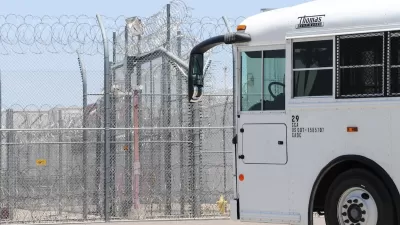A 2014 complaint about segregated housing lodged with the Department of Housing and Urban Development could revive integrationist housing policies to improve opportunities for all residents.

“Although Minneapolis remained over 90 percent white until the 1980s, civil rights activists scored serious victories in the mid-20th century. But as the city, and region, grew more diverse, desegregationist policies were increasingly stymied,” writes Jake Blumgart in Governing. Today, “The majority of the region’s subsidized housing is built in lower-income areas, while over a quarter of Black students go to deeply segregated schools — up from almost none 30 years ago.”
These conditions aren’t unique to Minneapolis. “Last year, a study out of the University of California, Berkeley, found that 81 percent of American metropolitan areas with populations over 200,000 were more segregated in 2019 than they had been in 1990.” Meanwhile, research shows that residents of resource-rich neighborhoods have better economic and health outcomes, making where you live a key determinant of social well-being.
Now, local activists are bringing attention to a 2014 complaint lodged with the Department of Housing and Urban Development (HUD) that could “reinvigorate more integrationist policies” if HUD threatens to withhold funds. “But, given how long the 2014 case has been left on the back burner, there are legitimate questions of whether this form of pressure will bring relief in a meaningful time frame,” warns Blumgart. Additionally, “The complaint about the Metropolitan Council wouldn’t address housing in Minneapolis and St. Paul (those cities already settled a separate complaint brought by [Michael Allen, a national civil rights lawyer]).”
However, “Prominent leaders in the region, like Minneapolis’ Jacob Frey, also express broad support of the goals of building more subsidized housing in more privileged neighborhoods and municipalities.”
FULL STORY: Can the Feds Force the Twin Cities to Tackle Segregated Housing?

Alabama: Trump Terminates Settlements for Black Communities Harmed By Raw Sewage
Trump deemed the landmark civil rights agreement “illegal DEI and environmental justice policy.”

Planetizen Federal Action Tracker
A weekly monitor of how Trump’s orders and actions are impacting planners and planning in America.

The 120 Year Old Tiny Home Villages That Sheltered San Francisco’s Earthquake Refugees
More than a century ago, San Francisco mobilized to house thousands of residents displaced by the 1906 earthquake. Could their strategy offer a model for the present?

In Both Crashes and Crime, Public Transportation is Far Safer than Driving
Contrary to popular assumptions, public transportation has far lower crash and crime rates than automobile travel. For safer communities, improve and encourage transit travel.

Report: Zoning Reforms Should Complement Nashville’s Ambitious Transit Plan
Without reform, restrictive zoning codes will limit the impact of the city’s planned transit expansion and could exclude some of the residents who depend on transit the most.

Judge Orders Release of Frozen IRA, IIJA Funding
The decision is a victory for environmental groups who charged that freezing funds for critical infrastructure and disaster response programs caused “real and irreparable harm” to communities.
Urban Design for Planners 1: Software Tools
This six-course series explores essential urban design concepts using open source software and equips planners with the tools they need to participate fully in the urban design process.
Planning for Universal Design
Learn the tools for implementing Universal Design in planning regulations.
Clanton & Associates, Inc.
Jessamine County Fiscal Court
Institute for Housing and Urban Development Studies (IHS)
City of Grandview
Harvard GSD Executive Education
Toledo-Lucas County Plan Commissions
Salt Lake City
NYU Wagner Graduate School of Public Service





























